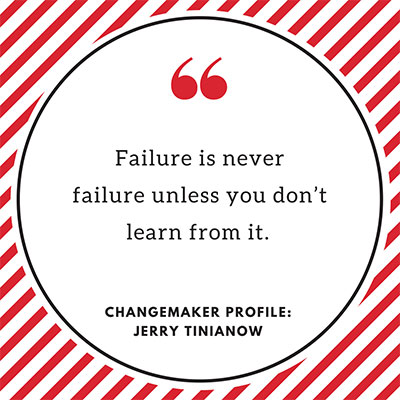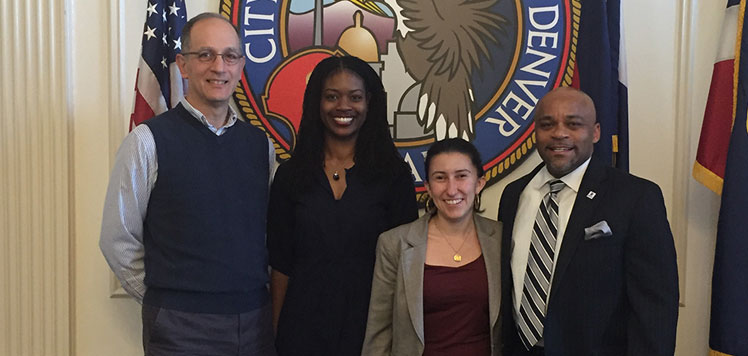This week (prior to the Paris Climate Agreement controversy), we spoke with Jerry Tinianow, chief sustainability officer with the City and County of Denver Office of Sustainability. In this role, which he’s had for nearly five years, Jerry is a leader in the field–and enjoys working with other inspiring #changemakers like Sonrisa Lucero (who we recently profiled, too)!
1. Tell us about you and the Office of Sustainability, and the social change you are trying to achieve.
“I am a sustainability executive—knowing that that term is not really very well defined. It’s my third career, but I’ve been volunteering in the area of sustainability for over 40 years. The Office of Sustainability was created by Mayor Hancock. It used to be called Green Print Denver, but then Mayor Hancock elevated it to the level of his cabinet and gave it a different mandate than before. Now, we are focused on projects operating on a large scale and instilling sustainability as a core business value within all of our agencies. Sustainability is no longer ‘off to the side’ but is being integrated throughout the city bureaucracy. Our work is to get people in institutions ensuring that basic resources are available and affordable to everyone, both today and in the future.”
2. What keeps you inspired and going when things get tough?
“I’ve been doing this work for over four years. I grew up in Cleveland during the era of ‘the river that burned’ and experienced the terrible air pollution there as a child. Today is the best time ever for sustainability. We are today achieving things now that we only dreamed about years ago. When we started out, we were debating whether we would do solar power; now we’re discussing the logistics and strategy of how we will implement solar. That keeps me going—seeing dreams realized. Some high school classmates of mine are retiring—and I’m nowhere close to retiring. I’m inspired by how much more we can accomplish today than we ever could before.”
 3. What advice would you give to someone who is trying to break new ground in a traditional field?
3. What advice would you give to someone who is trying to break new ground in a traditional field?
“Change doesn’t come instantly. It requires repeated efforts and building in a strategic way over time. You have to expect to fail. Failure is never failure unless you don’t learn from it. Be prepared for a lot of rejection. It’s kind of like baseball: the Hall of Fame superstars only get a hit one out of every three times—and those are the superstars! It’s like that with sustainability. Sometimes the messenger, delivering bad news, gets shot—even if it’s the truth. Frequently in my life, I have been pushed away at the time for being the messenger of difficult news, but often times, later on, people have recognized the value of what I was trying to communicate. Be persistent, and really treasure it when you get acceptance.”
4. What book do you recommend to everyone you meet and why?
“I would suggest if you were to read one book, read The Smart Growth Manual by Andres Duany, Jeff Speck and Mike Lydon. They all are fabulous thinkers and writers—check out all of their books. That book may be the foundation of everything else that I do.”
“In terms of fiction, I often recommend Edward Abbey’s great book, The Monkeywrench Gang, and its sequel, Hayduke Lives!”
5. How have you worked with Joining Vision and Action (JVA), and how has that helped your organization?
“JVA advised the city on fundraising. While I didn’t work directly with them on any fundraising project, I did see them help people with less experience in that area get more comfortable with doing it. They also supplied facilitators for the second Sustainable Denver summit. I got to see a lot of different facilitation styles, which was great.”
6. What else would you want to share with us that we haven’t asked?
“We’re on the cusp of some fabulous opportunities in sustainability right now. I realize that a lot of people reading this blog may not be as old as me, and may not remember how bad things were in the 1960s and ’70s, and how Congress created laws to protect our environment like the Environmental Protection Agency. … Don’t take for granted how things are now. I grew up in Cleveland during an era of rampant pollution. The first thing you’d notice was the smell coming into town. I am so glad it’s not like that anymore, and I never want to go back to that time. We have to be vigilant. Things can be much worse—and we must work to protect them. We can make progress and we do make progress, but we have to keep working on it.”







Leave A Comment